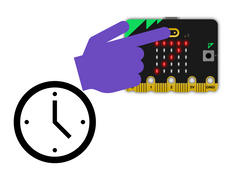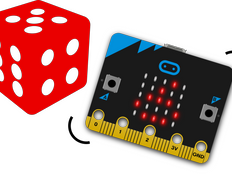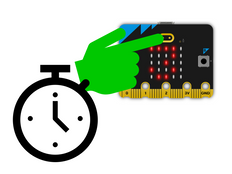Passo 1: Faz tu mesmo
O que é isto?
Turn your micro:bit into a ‘hot potato’ by coding it to become a random timer. To play the game, pass the ‘micro:bit potato’ on to the next person before the timer goes off.
How to play it
Press button A and pass the ‘hot potato micro:bit’ around a circle of players. If it makes the sad sound and turns to a cross while you are holding it, then you are out. The last person left is the winner.
Como é que funciona
This project uses button A as in input to start a series of events.
First the ‘timer’ variable is set to a random number between 5 and 15, and a chessboard image appears on the LEDs.
Then the ‘timer’ variable starts counting down, changing by –1, once a second, until it gets to 0.
The 'while loop' helps us shorten the code. While the ‘timer’ variable is above zero, the section of code counting down keeps repeating, but as soon as the ‘timer’ variable reaches zero, the loop stops.
Put the code on a micro:bit and attach a battery pack to turn it into a ‘hot potato micro:bit’.
Do que é que precisas
- micro:bit (ou simulador MakeCode)
- Editor MakeCode ou Python
- suporte de pilhas
Passo 2: Cria o teu código
Passo 3: Melhora-o
- Change the duration of the timer to suit different tasks or change from random to a specific length of time.
- Modify the program so a different icon or your own picture appears when you press button A.
- Change the sound to a happy/positive sound to indicate when someone has ‘won’ something.
- Use it in different contexts, for examples, to practise spellings or times tables, or use as a class countdown.
This content is published under a Creative Commons Attribution-ShareAlike 4.0 International (CC BY-SA 4.0) licence.


